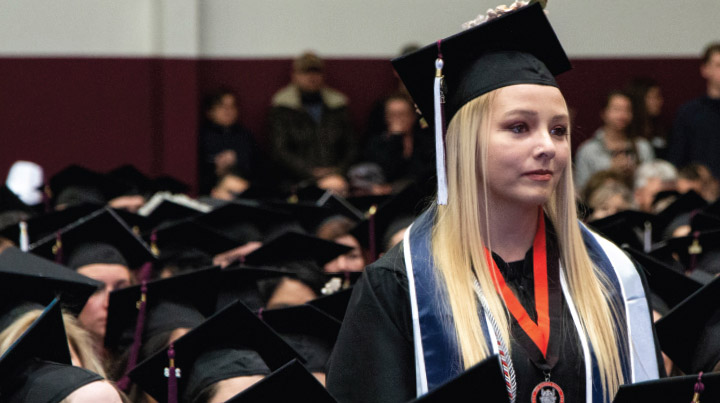CMU values the more than 4,000 students who identify as first-generation
There is a palpable excitement at university commencement ceremonies — graduates grinning from ear to ear, some hoisting their diplomas overhead with excitement as they cross the stage, while family and friends beam with pride. It’s an emotional day for everyone, but even more so for first-generation students and their families.
First-generation students are the first in their family to attend and attain their degree from a four-year institution — 44 percent of CMU students identify as first-generation.
Recent graduate Amanda Miller is among the 44 percent.
Miller’s road to a degree was filled with many challenges others don’t normally face — she was in and out of foster care as her mother battled drug and alcohol addiction until she was placed with her grandmother at age 13.
“I think my background just made me really look at what I wanted to do and how I wanted to change the world around me.”
She knew from an early age that she wanted to go into forensic science to help people through scientific proof. Miller graduated with a degree in biology and a double minor in chemistry and forensic science with the hopes of working for an FBI lab one day.
Miller’s grandmother was in the packed stands this past December and proudly watched as the first member of her family received a degree.
First-generation students face different obstacles when applying for and attending college. They are navigating higher education without much guidance from their family members who have limited or no collegiate experience.
“As first-generation students we run into obstacles that many might not think of,” said Celeste Martinez, who will graduate from the mass communication program in December 2019. “When I first applied for college I had absolutely no idea how to do so…I had to seek help and try my hardest to understand IRS documents, grants, apply for as many scholarships as I could and try to be as informed as I could be.”
Martinez’ parents, who immigrated to the U.S. when she was young, were not able to help much with the administrative and financial aspects of applying for college but fully supported her pursuit of higher education.
Unique challenges that first-generation students face don’t stop once they are accepted.
CMU’s TRiO Student Support Services, now in its eighth year, is one of CMU’s support systems designed to help students succeed in college. To be eligible for the program a student must be enrolled full-time in a fouryear degree, be a U.S. citizen or permanent resident and meet one of the following criteria: neither parent graduated from a four-year college, student is economically disadvantaged or student has a disability.
TRiO served 151 participants in the 2016-17 academic year with 90 percent of those students in good academic standing. This program supports students in their academic, personal and career goals and works to increase retention and graduation rates of the participants.
“We look at them as a whole student,” said TRiO Director Melissa Calhoon, who was a first-generation student herself. She said this includes looking at a student’s academics; helping them understand financial literacy, basic budgeting, scholarships and internships; setting career goals; leadership and communication skills as well as addressing any of their personal concerns.
Staff and student mentors are an important part of the program.
As first-generation students navigate higher education and attain their goals — whether that is to become a nurse, an engineer or a teacher — they are setting a new precedent for their families and altering the future of generations to come.
“First-generation students make a profound difference in their children’s lives and their grandchildren’s lives,” said Assistant Vice President of Academic Affairs for Student and Faculty Success Aparna Palmer. “But they also affect people in the same generation, maybe a sibling or cousin, so they impact both the present and the future.”
This past November, five first-generation students including Miller and Martinez, told their personal stories at the Fearless First celebration held at CMU. Each story was unique, inspiring and demonstrated the resilience and perseverance of each student.
“Founders of the nation’s first institution of higher education, including Benjamin Franklin, spoke about education being the key to closing inequities and creating upward mobility in a democratic society,” said CMU President Tim Foster. “Helping first-generation students, and celebrating the values they represent, is important.”
